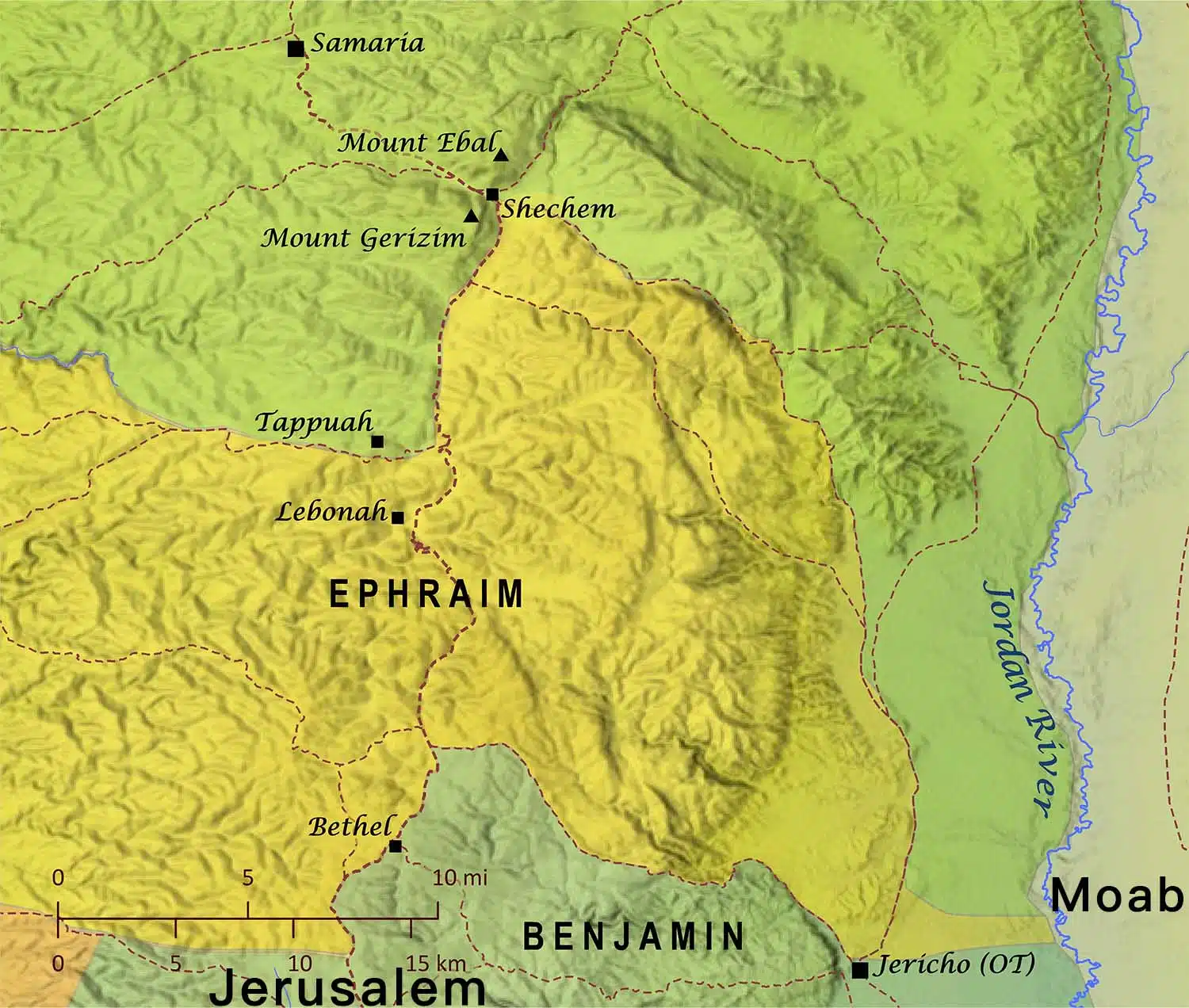In these verses, Moses continued to describe the covenant renewal ceremony. He arranged the people of Israel into two sets of six tribes in preparation of the recitation of the blessings and curses that follow. These verses should be read together with Joshua 8:30 – 35, where these instructions are fulfilled.
In preparation for the recital of the blessings and curses, Moses also charged the people on that day (v. 10). He commanded them concerning the things that must be done when you cross the Jordan (v. 12). He told them some of the tribes were to stand on Mount Gerizim, which was south of Shechem, and opposite Mount Ebal ( see map on insert). These tribes were tasked to bless the people. The tribes in view here were Simeon, Levi, Judah, Issachar, Joseph, and Benjamin. These six tribes were all descendants of the two wives of Jacob: Leah and Rachel (Genesis 35:23–24). These six tribes made up half the tribes, which totaled twelve.
These six tribes were to pronounce a blessing upon Israel. This represents the blessings that were set forth in the Suzerain-vassal-style covenant that God entered into with Israel, that had just been ratified and renewed by the second generation (Deuteronomy 26:17). The people who are gathered to hear Moses are preparing to enter the land. This ceremony is to be conducted once they enter and secure the land.
The ceremony appears to have been intended to cement in the minds of the participants that there were great blessings in store for following the statutes of God’s law. Many of the blessings would be the natural consequence of having a society based on a culture of mutual respect and loving our neighbor as we love ourselves. But God also promised divine blessings.
The other six tribes were to gather for the curse (v. 13). The tribes that were to stand on Mount Ebal were Reuben, Gad, Asher, Zebulun, Dan, and Naphtali. Mount Ebal lies to the north of Shechem. These tribes were descendants of Jacob’s concubines, Bilah and Zilpah (Genesis 35:23–26), except for Reuben and Zebulun who were sons of Leah (Genesis 29:32; 30:20). These constituted the other half of the twelve tribes.
These six tribes were to pronounce the curse upon Israel. This represents the adverse consequences for disobedience to the provisions set forth in the Suzerain-vassal-style covenant that God entered into with Israel, that had just been ratified and renewed (Deuteronomy 26:17). This ceremony appears to have been intended to cement in the minds of the participants that there were great adverse consequences, curses, in store for violating the statutes of God’s law, for breaching the agreement they had entered into with God.
Many of the cursings would be the natural consequence of failing to advance their society based on a culture of mutual respect and loving our neighbor as we love ourselves, and in falling into a culture of mutual exploitation. But God also promised divine cursings.
At this point, Israel is in Moab listening to Moses, and they are being instructed to conduct a ceremony on two mountains in the Promised Land, once they have crossed the Jordan River, and victoriously taken the land. So it is somewhat like planning the victory celebration before even playing the game. At this point, God appears to be making it clear that victory is certain, if they will follow His directives.
Biblical Text
11 Moses also charged the people on that day, saying, 12 “When you cross the Jordan, these shall stand on Mount Gerizim to bless the people: Simeon, Levi, Judah, Issachar, Joseph, and Benjamin. 13 For the curse, these shall stand on Mount Ebal: Reuben, Gad, Asher, Zebulun, Dan, and Naphtali.
Check out our other commentaries:
-
Jude 1:24-25 meaning
Jude praises God, for it is God who can keep us from falling away from His fellowship, so that we can stand before Him one...... -
Deuteronomy 29:9-15 meaning
Moses described the parties that were about to enter into this additional covenant between the Suzerain (Ruler) God and the Israelites. This covenant will establish...... -
Hebrews 10:11-14 meaning
Earthly priests make animal sacrifices again and again, yet they cannot take away sins. Christ, in one sacrifice, covered sins forever. Christ now sits on...... -
Galatians 3:6-9 meaning
Abraham gained right standing with God through his faith, not by the law (which didn’t exist at the time God made His promise to Abraham)....... -
Proverbs 2:16-19 meaning
Temptation threatens to drive us away from reality, from truth. Its falsity leads to deadness. Wisdom can save us from believing in the seduction of......




